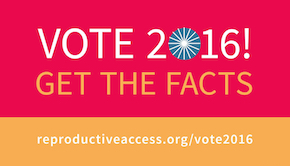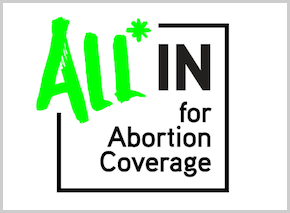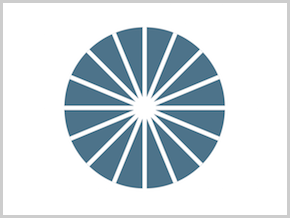Nov 06

Help Us Protect Access to Sexual and Reproductive Health Care Today!
Newsletter/August 2016

Fatigued after last month’s national conventions? Take a deep breath and #GetTheFacts with RHAP’s pro-choice voter guide! Our Vote 2016: Get the Facts guide provides national and state-by-state resources to help you make informed decisions this election cycle.
So far this year, 14 states have passed more than 30 laws restricting abortion access. Though last month’s Supreme Court victory in Whole Woman’s Health v. Hellerstedt struck down some provisions of Texas’ anti-abortion House Bill 2, anti-abortion legislation across the country continues to make comprehensive reproductive health care a privilege, instead of a fundamental right.
Find out who is running to represent you in this year’s presidential and legislative elections, and make sure they support the reproductive health policies important to you. Our voter guide includes information on Presidential, Senate, and House candidates, as well as resources for where and when to register to vote in your state.
Our voting toolbox also includes information on actions organized by All* Above All, Act for Women, and Coalition for Liberty and Justice. Check back in for updates, as our voting guide will grow as more national and local resources become available.
Have additional resources you want posted? Send us an email at info@reproductiveaccess.org.

The Supreme Court decision in Whole Woman’s Health v. Hellerstedt in June was a huge step forward for our movement. But even with this favorable ruling, as Justice Ruth Bader Ginsburg said, “Reproductive freedom is in a sorry situation in the United States. Poor women do not have choice.” We must now battle one of the most significant barriers to abortion care — the Hyde Amendment.
The Hyde Amendment is language that gets added yearly to the Labor, Health and Human Services, Education and Related Agencies appropriations legislation that bars programs in these agencies from covering abortion. Since the passage of the Hyde Amendment in 1976, Congress has withheld coverage for abortion services from those insured through the Medicaid program. The Hyde Amendment creates an often insurmountable barrier for people to exercise their constitutional right to abortion care. When coverage is denied, the brunt is borne by those who are low-income, people of color, and rural populations. The Hyde Amendment is NOT permanent law and Congress has the opportunity to lift this ban on abortion coverage each year.
This September will mark 40 years of Hyde. We believe that it is high time we ended Hyde because abortion care is basic health care that everyone should have access to!
In an effort to help repeal the Hyde Amendment and increase access to reproductive health care for everyone, the Reproductive Health Access Project joined a coalition called All* Above All. All* Above All unites organizations and individuals to build support for lifting bans that deny abortion coverage so that everyone, at every income level, can get affordable, safe abortion care when they need it. Learn more about how you can become involved in the fight to repeal Hyde at allaboveall.org/act!
*Since this September does mark 40 years of Hyde, we will be talking more about the Hyde Amendment and how you can help repeal it in the coming weeks so stay tuned!

In light of the Supreme Court victory in Whole Woman’s Health v. Hellerstedt we spoke with RHAP Fellow Dr. Martha Simmons. She shared a recent patient experience with us that she found especially meaningful.
“Danielle*, one of my regular patients, came to me for a Depo Provera shot. Previously, she had been using condoms and Plan B as birth control, but decided that the Depo shot was a better form of contraception for her. During her appointment, she was given a pregnancy test – a standard procedure – that came back negative, and she received the first Depo shot that same day.
A few weeks later, Danielle started feeling pregnant so she returned to the health center. This time, her pregnancy test was positive. It turns out she had been pregnant at the time of her first visit, but it was so early on that it didn’t show up in the test. It was a really hard visit. She didn’t want to be pregnant and she had been trying [proactively] to make sure she didn’t become pregnant, and it just didn’t work out. She was frustrated and felt bad about being in this situation. In the end, Danielle decided she wanted an abortion. I felt so lucky to be practicing in New York, where I can be Danielle’s primary care provider and be able to perform the abortion for her without worrying about restrictive laws. I could focus on taking care of her and counseling her through this hard decision.
Danielle’s situation really makes me think about all the times when our patients are trying to make the best choices for themselves, but things don’t always work out perfectly. We talk a lot about increasing contraception to reduce the need for abortion, but as we know, contraception is never a 100% guarantee. Situations [like Danielle’s] remind me even more how much we really need to keep abortion accessible for people, and how much we have to continue working to expand access. [The Whole Woman’s Health v. Hellerstedt decision] was a huge victory for those patients like Danielle in other states where access to abortion is a lot more limited than here in New York, but there’s still more work to do!”
*Pseudonym used to protect patient’s privacy
Dr. Martha Simmons is a 2015-2016 RHAP Reproductive Health and Advocacy Fellow and a primary care physician at a community health center in New York City.

The Reproductive Health Access Project (RHAP) is now recruiting interns for this Fall! Our Interns play a key role in ensuring that the Reproductive Health Access Project fulfills its mission by supporting the staff of this small but busy organization. We are currently seeking a Development and Communications Intern and a Program Support Intern to begin work in late August or early September. You can click here to find more detailed information about both these positions on our website.
These are exciting opportunities for enthusiastic, self-starters to apply and develop their skills. Please see below for how to apply.
How to Apply:
Send a cover letter, resume, three references, and short writing sample (1-3 pages) to hr@reproductiveaccess.org. Please indicate which internship position you are applying for in the subject line of your email. Only complete applications will be reviewed. Application deadline is rolling. We will accept applications on a first-come, first-served basis.
More Information:
The Reproductive Health Access Project is an equal opportunities employer. At this time, RHAP is unable to offer financial compensation to our interns. These are unpaid internship positions. We are able to offer school credit for undergraduate interns. Click here more information or contact hr@reproductiveaccess.org.
Subscribe to receive monthly updates from the Reproductive Health Access Project.
Your gift allows us to train and support health care providers across the United States so they can offer patients compassionate and comprehensive care.
Nov 06
